Children Crash a Professor's BBC Interview
 Professor Robert Kelly certainly didn't expect this type of fame. More than 15 million people have seen the professor of political science in a BBC interview interrupted by his children.
Professor Robert Kelly certainly didn't expect this type of fame. More than 15 million people have seen the professor of political science in a BBC interview interrupted by his children.
The video is hilarious and shows an embarrassed, yet quietly laughing Kelly as his two children come into his office, eventually rescued by his wife.
Of course, everyone seems to have an opinion on Kelly's parenting skills from this short encounter. Maybe Kelly was right to question BBC's posting of the video. When asked for permission to post it on Twitter, Kelly said, "What would that mean, please? Re-broadcasting it on BBC TV, or just here on Twitter? Is this kinda thing that goes ‘viral' and gets weird?"
According to The Telegraph, "The academic's mother, Ellen Kelly from Cleveland, Ohio, said the incident may have occurred after the children thought they were Skyping their grandparents."
Discussion:
- How did Kelly handle the interruption? Should he have done something different?
- Are people right to criticize his parenting skills? Why or why not?
- How did the BBC reporter respond? Also, should he have done something different?
- Kelly's Twitter page now has 21.5k followers, but he's not saying a word. Should he?
Signet CEO Responded to Criticism, But Is Silent Now
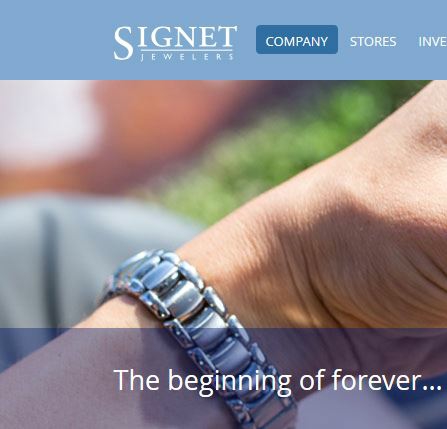 Signet Jewelers, the largest U.S. jewelry retailer and owner of Zales and Kay, is facing criticism from investors, employees, and customers. The stock fell 25% at the beginning of 2016-a notable decline in a rallying market.
Signet Jewelers, the largest U.S. jewelry retailer and owner of Zales and Kay, is facing criticism from investors, employees, and customers. The stock fell 25% at the beginning of 2016-a notable decline in a rallying market.
Complaints about missing and swapped jewels and sexual harassment of employees are the latest to cause trouble for the company. But CEO Mark Light disputes these claims in an interview with CNBC.
He defends the company by saying, "We are all about trust." Reporters asked Light about customer credit and the "unusual amount of financing," which raises the question of what happens if customers default on their loans. To counter these concerns, Signet points to the company's 30-year history and their knowledge of customers. Light sees financing as a competitive advantage and says they are happy with their credit book.
Light does talk about continuous improvement and says they will "look at protocols going forward," but he also says, "We don't believe we have a serious problem."
This quarter, Signet earnings are up, but the controversy remains. The Motley Food reports, "CEO Mark Light continues to maintain his silence."
Discussion:
- What's your view of the situation? Is criticism about the company too harsh, is Mark Light in the dark, or what?
- How well goes Light address concerns about the company in this interview? What could he do differently to rebuild the brand? What should he do now?
Cancer Research Scientist Faces Credibility Questions
What The New York Times calls "years of ethics charges" have plagued a cancer researcher, but new problems may be his final undoing. Dr. Carlo Croce, at Ohio State University, has brought in $86 million in federal grants, but the Times reports, "he overstated his expansive claims for the therapeutic promise of his work, and that his laboratory is focused more on churning out papers than on carefully assessing its experimental data."
David A. Sanders, a virologist at Purdue University, has called out more than 20 of Croce's papers claiming falsified data: "It's a reckless disregard for the truth."
In a nifty, interactive visual, The New York Times shows how Croce's work was manipulated in one journal article. If you look closely, you see that a bright line is disjointed, warning that some copying and pasting took place. Indeed, samples 6, 7, and 8 are identical to 3, 4, and 5.
Also questionable is Croce's work as an advisor to the Council for Tobacco Research. Although Croce says he believes smoking causes lung cancer, the Council has used his work to prove otherwise.
One of the biggest questions is the role of Ohio State University: did the administration dismiss charges that should have been more seriously considered? The University responded to the article in a short opinion letter, concluding, "While the review is still underway, the independent experts have found that our policies meet with national research compliance standards. They have also found no evidence that Ohio State deviated from those policies in reviewing allegations of research misconduct."
Discussion:
- Read the NYT article. What do you believe are the most egregious claims against Croce?
- Look online for other examples of image manipulation in scientific journals. Should peer-review journals be more vigilant in catching these falsifications? Or are they too difficult to judge?
- Analyze the University's opinion letter. Which parts do you find most and least convincing?
Trump Team Typos
 The Trump Administration faced criticism this week because of typographical and spelling errors. A Politico article sums up the trouble:
The Trump Administration faced criticism this week because of typographical and spelling errors. A Politico article sums up the trouble:
Whether it is a wrong name (for an acting deputy attorney general or the prime minister of the United Kingdom), or a failure to distinguish your principles from your principals, the Trump administration's struggles with proofreading are profuse. The Department of Education misspelled the name of the co-founder of the NAACP. Then it compounded the error by making another error in a follow-up tweet.
Perhaps the most visible-and most recent-has drawn attention to the others:
Politico reminds us of another misspelling on the president's first day in office. He didn't learn the session from a tweet in February 2016 with the same mistake.

Discussion:
- What's your view of these errors: not a big deal, a chance for the press to pile on Trump, sloppy, irresponsible, or something else?
- The president clearly values direct, immediate communication. Are typos just an inevitable, sufferable consequence?
Medium's Layoff and Strategy Post
 Medium CEO Evan Williams, also co-founder of Twitter, posted news about the blogging site's new direction, including 50 layoffs. His blog post is a good example of communicating bad news in a respectful, sensitive way.
Medium CEO Evan Williams, also co-founder of Twitter, posted news about the blogging site's new direction, including 50 layoffs. His blog post is a good example of communicating bad news in a respectful, sensitive way.
In this post, Williams takes responsibility for past decisions that haven't panned out: 
Our vision, when we started in 2012, was ambitious: To build a platform that defined a new model for media on the internet. The problem, as we saw it, was that the incentives driving the creation and spread of content were not serving the people consuming it or creating it - or society as a whole. As I wrote at the time, "The current system causes increasing amounts of misinformation…and pressure to put out more content more cheaply - depth, originality, or quality be damned. It's unsustainable and unsatisfying for producers and consumers alike….We need a new model."
He also used plenty of emotional language to refer to people (e.g., "Obviously, this is a tough thing to do, made tougher by the immense respect and love we have for these people who have helped make Medium what it is today") and to refer to the business (e.g., "broken system").
Fortune reviews Williams' plan to change the business model, particularly focusing more on serving people, but the author is skeptical: "It is unclear how the company will approach the new goal."
Discussion:
- What examples of emotional language do you identify in Williams' post?
- How do you think employees reacted to the message? Consider employees both leaving and staying.
- He's quite open about the decision and plans for the business considering this is a public blog post. Why would he take this approach?
Supporting a Claim with Evidence
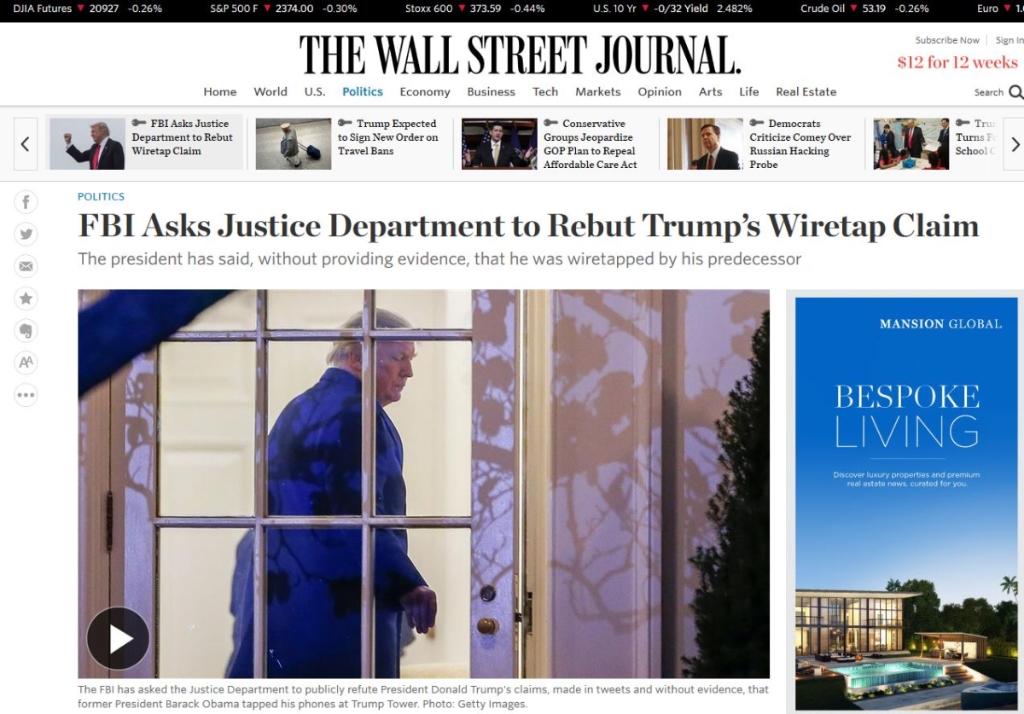 Business Communication students learn the importance of supporting claims with evidence in order to persuade an audience. President Trump's claim that former President Obama wiretapped his phone is being questioned by many reporters and the FBI.
Business Communication students learn the importance of supporting claims with evidence in order to persuade an audience. President Trump's claim that former President Obama wiretapped his phone is being questioned by many reporters and the FBI. 
FBI Director James Comey, in the news most recently for identifying more of Hillary Clinton's emails days before the election, seemingly without evidence, has asked the Justice Department to rebut the President's claims and to deny an investigation. This is an extraordinary request because, as The New York Times reports, this action "would be a major rebuke of a sitting president."
The Times also traces the claim, which started on a conservative radio show:
It began at 6 p.m. Thursday as a conspiratorial rant on conservative talk radio: President Barack Obama had used the "instrumentalities of the federal government" to wiretap the Republican seeking to succeed him. This "is the big scandal," Mark Levin, the host, told his listeners.
That was enough for President Trump to tweet his disgust.
I sometimes compare headlines in The New York Times and The Wall Street Journal. Today, they are both running this story as front page news, and even the more conservative WSJ says President Trump made this claim without evidence. The subtitle reads, "The president has said, without providing evidence, that he was wiretapped by his predecessor."
Discussion:
- What's your view of the president's response? Is it hasty, or did he have enough to go on?
- What should the Justice Department do with the president's request and James Comey's recommendation?
- What's the danger of the president's accusation? What if he's wrong? On the other hand, what's the danger of ignoring the potential violation? What if he's right?
Snap in Charts
Eric Spiegel, the founder of Snap Inc., is celebrating after a successful IPO that brought in $25 per share, a market value of $33 billion, and enough to bring his net worth to $6 billion, making him wealthier than Richard Branson, Donald Trump, and Oprah.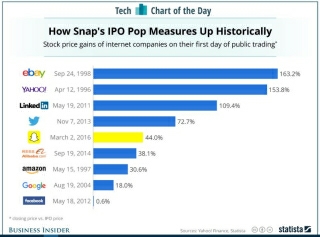
It's not the largest IPO, but the numbers are surprising, given that Snapchat is essentially an app, and 98% of its revenue comes from advertising. MarketWatch also reports losses:
Snap recorded $404.5 million in revenue in 2016, compared with $58.7 million in 2015. Net losses grew to $514.6 million in 2016, compared with a net loss of $372.9 million in 2015. Like many burgeoning tech startups, Snap warned that it "may never achieve or maintain profitability."
Still, the ad revenue is solid because of Snapchat's popularity with teens. As the second chart shows, Snapchat is highly popular and has seen a lot of growth between 2015 and 2016. 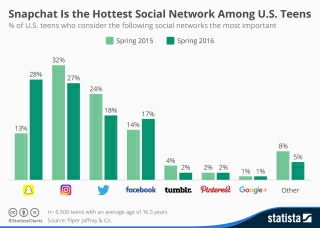
IPO image source and teen use image source.
Discussion:
- What principles for chart design from Chapter 9 are demonstrated in these two examples?
- What would you change about these charts to make them more effective?
- What 2017 data can you find about Snapchat? Create a new comparison chart.
Analyzing Trump's Tone in Speeches
How would you describe Trump's tone in his speeches? A New York Times article explains how sentiment analysis was used to compare his speeches over time and to other State of the Union addresses:
"That's according to a sentiment analysis of past speeches, which categorizes words according to several dimensions. Mr. Trump's campaign speeches used a high proportion of words associated with "anger" - like fight, illegal or bad - and a relatively low proportion of words with positive associations - like build, freedom or peace."

Sentiment analysis aside, his tone changes are pretty obvious. The best way I can describe his State of the Union address is "measured." He also gestured less and read more from the teleprompter-perhaps acting more presidential than we have seen him in less formal settings.
The Washington Post compiled the address "in 3 minutes." Of course, the compilation and the "winners and losers" identified by the author/editor are based on his own thinking about Trump/s plans and communications.
Discussion:
- How would you describe President Trump's tone in his State of the Union address? What, if anything, surprised you about the speech?
- The president certainly is adjusting to the audience and purpose of his speeches. Compare audiences for his campaign speeches and his official speeches as president. What are his objectives for each?
- With which of The Washington Post's conclusions do you agree and disagree? The author also refers to the speech as "strong." What do you think he means by this, and do you agree or disagree?
Uber CEO on Video
Uber CEO Travis Kalanick has apologized for his interaction with a driver that was video recorded. At the end of the trip, the driver, Fawzi Kamel, complained about Uber's lower prices. Kalanick explains that they have more competition, but the conversation got heated.
Kamel said, "People are not trusting you any more. . . . I lost $97,000 because of you. I'm bankrupt because of you. Yes, yes, yes, you keep changing every day."
Kalanick said, "Some people don't like to take responsibility for their own sh**," he said. "They blame everything in their life on somebody else. Good luck!" He also rated the driver with one star in the Uber app.
 A Guardian article explains the problem and quotes the executive director of the New York Taxi Workers Alliance:
A Guardian article explains the problem and quotes the executive director of the New York Taxi Workers Alliance:
Drivers for Uber Black, such as Kamel, face particular struggles because they are required to drive recent models of select premium vehicles. Drivers earn a higher rate, but they are increasingly competing with Uber's cheaper UberX rides.
Bhairavi Desai, the executive director of the New York Taxi Workers Alliance, called Kalanick's interaction with Kamel "heartless" and "appalling."
"Fawzi Kamel's plight is far from unique," she said. "We've talked to so many drivers who have been left in insurmountable debt after purchasing or leasing vehicles based on promised income from Uber then unable to make the payments as Uber has slashed fares, increased its commission, and flooded the streets with too many vehicles."
In uncharacteristic fashion for Uber, Kalanick apologized.
Discussion:
- What is Kamel's role in this situation? Did he behave 100% honorably?
- How could Kalanick have avoided the situation?
- What do you make of Kalanick's apology?
Communication Failures at the Oscars
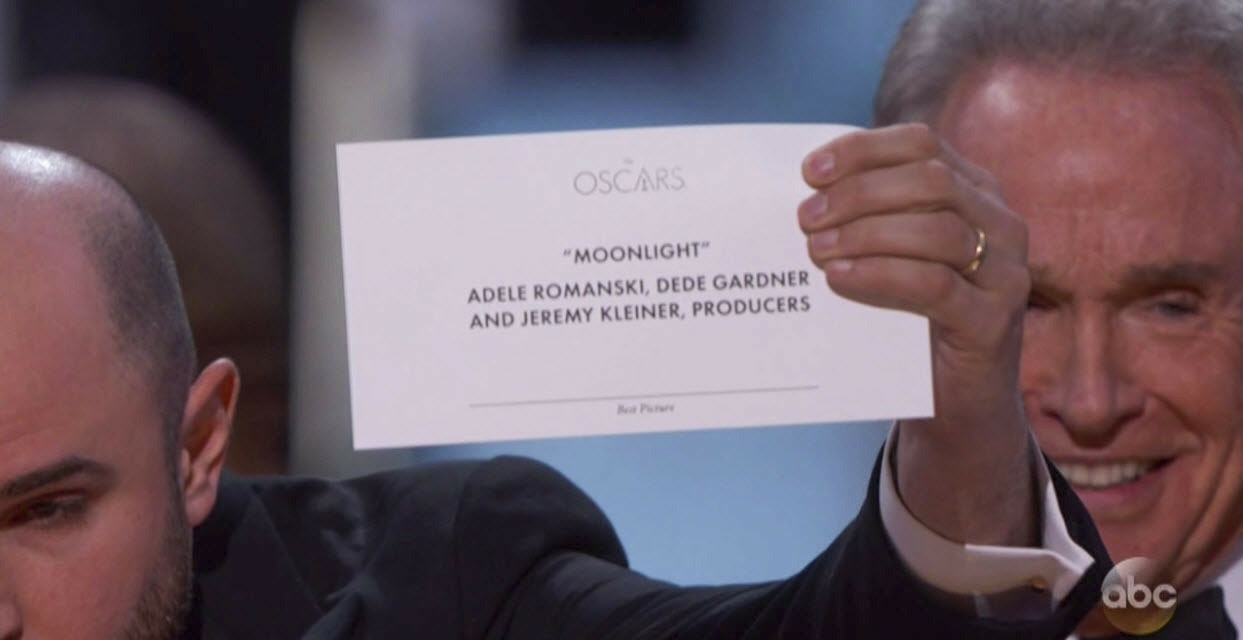 The RIGHT envelope, please! The Academy Awards suffered embarrassment at this year's event when the wrong winner was announced as Best Picture. Several communication failures caused the problem:
The RIGHT envelope, please! The Academy Awards suffered embarrassment at this year's event when the wrong winner was announced as Best Picture. Several communication failures caused the problem:
- The first and most critical error was PwC's responsibility: the wrong envelope was given to announcers Warren Beatty and Faye Dunaway.
- Beatty opened the card and saw "Emma Stone, La La Land." He hesitated and passed the card to Dunaway.
- Dunaway confidently announced the winner: "La La Land!" She didn't question it either.
- The La La Land folks came on stage and gave three acceptance speeches. They were stopped, but it took too long and could have saved further embarrassment.
- La La Land Producer Marc Platt said, "This is not a joke. They read the wrong thing." But this puts the blame entirely on the announcers, when the original error is the wrong envelope. Of course, Platt didn't know what happened, and he was trying to be gracious about the fiasco.
- PwC wrote a short statement, promising an "investigation," which is probably overstated: "We sincerely apologize to 'Moonlight,' 'La La Land,' Warren Beatty, Faye Dunaway, and Oscar viewers for the error that was made during the award announcement for Best Picture. The presenters had mistakenly been given the wrong category envelope and when discovered, was immediately corrected," the company said. "We are currently investigating how this could have happened, and deeply regret that this occurred."
Discussion:
- What could have been done differently during each step of this mistake?
- Should PwC say something different? The company has had the Oscars account for 83 years. Should the organization fire them? Why or why not?
NYT Ad Promotes Truth
 We don't expect The New York Times to advertise during the Academy Awards, but the company will for the first time this year. The topic is, "The Truth Is Hard."
We don't expect The New York Times to advertise during the Academy Awards, but the company will for the first time this year. The topic is, "The Truth Is Hard."
The striking, 30-second black-and-white ad displays sentences starting with "The truth is our nation is more divided than ever." We see only words but hear multiple voices in the background increasing in intensity until The New York Times logo shows at the end, after a dramatic pause and blank screen.
An AdAge article called the spot "the publication's first-ever brand campaign in a decade" and quotes NYT Head of Brand David Rubin about the strategy:
"Picking a program that was high-profile and that would get people talking made sense for us," said New York Times Senior VP-Head of Brand David Rubin. "If one of our objectives was to insert ourselves in the debate that's going on that, frankly, we've been a part of, a high-profile media buy made sense."
And why a new brand campaign, now? "There's a national dialogue going on now about facts and truth and how does one know what the truth is," he said. "We saw an opportunity to be part of that dialogue. We also found in our research that people don't always understand what it takes to do quality original reporting, but when they do, when that becomes part of the dialogue -- about how one finds the truth and about the role journalists can play, they are more interested in supporting it."
An executive on the ad agency team, Droga5, said, "the truth is hard . . . It doesn't matter what side of the spectrum you're on politically." The ad comes in the midst of President Trump's criticism of the media as "fake news" and "an enemy of the American People!"
The commercial complements a print ad, shown here.
Discussion:
- What are the publication's objectives for this ad campaign? Consider company branding and the current political climate.
- How effective do you find the spot? How well does it achieve its objectives?
- Why did the company choose the Oscar's for the ad? Why not, for example, the Super Bowl?
Warren Buffett's Annual Letter
 It's that time again, when Berkshire Hathaway shareholders and Warren Buffett devotees pore over his annual letter.
It's that time again, when Berkshire Hathaway shareholders and Warren Buffett devotees pore over his annual letter.
Forbes identifies as "The Seven Best Quotes" in the letter, summarized as follows:
- Stock Buybacks Aren't Always Bad
- Vanguard's John Bogle Is A Hero
- Don't Bet Against America
- Fake Profits!
- Fees... Cut It Out!
- Why Berkshire Loves Dividends
- Buy When Others Are Fearful
This year, as The Wall Street Journal reports, Buffett "declared victory in a decade-long, $1 million bet that low-cost index funds would earn more than expensive hedge funds." This conclusion is reflected in at least two of the quotes Forbes selected: the one about Vanguard and the one about fees.
Berkshire Hathaway's website lists Buffett's annual letter every year since 1977. The website design is so simple-some might say boring.
Discussion:
- Analyze the letter using business writing principles. Who are the primary and secondary audiences? How it is organized? What are the main points? How would you describe the writing style?
- Check out the website. What's your impression? Why do you think it looks as it does?
What's in a Handshake?
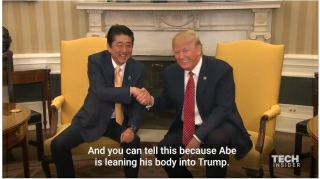 Business Insider asked Dr. Lillian Glass, a self-described body language expert to analyze President Trump's body language. She says Trump's "robust" handshake with the prime minister of Japan communicates, "Hey, we get along. I really like you." She says the PM's body language communicates the same and says that Trump's "cupping" his hand (placing his hand over the prime minister's) also indicates affection.
Business Insider asked Dr. Lillian Glass, a self-described body language expert to analyze President Trump's body language. She says Trump's "robust" handshake with the prime minister of Japan communicates, "Hey, we get along. I really like you." She says the PM's body language communicates the same and says that Trump's "cupping" his hand (placing his hand over the prime minister's) also indicates affection.
But comedians The Young Turks criticize the exchange, including audio of the prime minister telling Trump, "Look at me" and, immediately after the handshake is finished, pulling his body away and looking like he wants to leave.
Dr. Glass says Trump's handshake with the British prime minister shows "he's very respectful" and that "he doesn't know her that well or, you know, that he doesn't have the same affection towards her as the others."
With Justin Trudeau, the prime minister of Canada, Glass says Trump and he had a warm handshake, and placing a hand on the arm "indicates friendship." A body language expert who analyzed this move by President Obama said it demonstrated power. Glass says Trump's body language with Obama shows tension.
Discussion:
- If it's not obvious from this post, I'm skeptical about some of Glass interpretations. What do you think?
- What about the context of these interactions could affect our interpretation? Consider that these are short clips, possibly edited, and are in front of the media.
- What, if any, lessons from this can you glean for job interviews? How would you describe your own approach to shaking hands in a business situation?
More Ethical Questions for Uber
 Susan Fowler, a former Uber engineer, has blasted the company for what she describes as sexual harassment, a sexist environment, and HR's failure to respond. Fowler also reports that only 3% of engineers are women at Uber, which she claims has fallen over time.
Susan Fowler, a former Uber engineer, has blasted the company for what she describes as sexual harassment, a sexist environment, and HR's failure to respond. Fowler also reports that only 3% of engineers are women at Uber, which she claims has fallen over time.
When she reported sexual harassment, she was given a choice to move to another department or stay and likely receive a poor performance review. This is a basic "don't" in HR, from my experience: you don't move the victim and put him or her at a disadvantage. According to Fowler, no further action was taken in the case, although other women received similar treatment by the same manager.
At this point, Fowler's complaints are getting attention. CEO Travis Kalanick wrote that he would look into the situation:
"I have just read Susan Fowler's blog. What she describes is abhorrent and against everything Uber stands for and believes in. It's the first time this has come to my attention so I have instructed Liane Hornsey our new Chief Human Resources Officer to conduct an urgent investigation into these allegations. We seek to make Uber a just workplace and there can be absolutely no place for this kind of behavior at Uber -- and anyone who behaves this way or thinks this is OK will be fired."
Ariana Huffington, an Uber board member, jumped into the conversation on Twitter:
From interviews and messages from Uber employees, a New York Times article reports an "aggressive, unrestrained workplace culture." Kalanick further addressed the controversy in an email to employees that begins: "It's been a tough 24 hours. I know the company is hurting, and understand everyone has been waiting for more information on where things stand and what actions we are going to take."
Discussion:
- Read Fowler's blog post. What persuasive strategies does she use (logical arguments, emotional appeals, and credibility)? Which parts are most and least convincing?
- How should the company respond? An investigation is a good start: what should this include, how should it be carried out, and what result would you expect?
Milo Yiannopoulos Loses Speaking Engagement and Book Deal
 Milo Yiannopoulos has an active following for the very reason he lost a speaking engagement and book deal: he's out there. A New York Times article refers to him as "a polemical Breitbart editor and unapologetic defender of the alt-right," and he seems to say whatever he wants, which isn't a bad thing-until it is.
Milo Yiannopoulos has an active following for the very reason he lost a speaking engagement and book deal: he's out there. A New York Times article refers to him as "a polemical Breitbart editor and unapologetic defender of the alt-right," and he seems to say whatever he wants, which isn't a bad thing-until it is.
Earlier this month, a college tour at UC Berkeley was canceled when protests ended in violence, and today, he lost the chance to speak at the Conservative Political Action Conference. The latest controversy comes from a video in which Yiannopoulos seems to condone pedophilia. Yiannopoulos denies the allegations and "blamed 'British sarcasm' and 'deceptive editing,'" according to the Times.
Simon & Schuster canceled plans for his book, "Dangerous." In a statement, Yiannopoulos said, "The people whose views, concerns and fears I am articulating do not sip white wine and munch canapés in gilded salons. And they will not be defeated by the cocktail set running New York publishing. Nor will I."
According to the Times article, Yiannopoulos's position at Breitbart is under consideration:
Mr. Yiannopoulos, who has railed against Muslims, immigrants, transgender people and women's rights, is a marquee contributor to Breitbart News, where he serves as senior editor. He has amassed a fan base for his stunts and often-outrageous statements. But by Monday afternoon, his future at the website was being intensely debated by top management.
One Breitbart journalist, who requested anonymity to describe private deliberations, described divisions in the newsroom over whether Mr. Yiannopoulos could stay on. There was some consensus among staff members that his remarks were more extreme than his usual speech, the journalist said, and executives were discussing by telephone whether his apology was enough to preserve his position at the site.
[Update: Yiannopoulos resigned from his Breitbart position.]
I saw Yiannopoulos for the first time on "Real Time with Bill Maher." What struck me most was this statement: "Mean words on the internet don't hurt anyone." Really? Who gets to decide?
Discussion:
- Did the organizers of the Conservative Political Action Conference and Simon & Schuster make the right decision? Did UC Berkeley?
- What's your perspective on Yiannopoulos' comment, "Mean words on the internet don't hurt anyone"? Who does get to decide?
Kraft Heinz Withdraws Unilever Bid
 Kraft Heinz won't acquire Unilever, after all, the two companies announced in a joint press release. The news sent ripples through Unilever's stock, which fell 7% after rising 13% on the initial news. 13%.
Kraft Heinz won't acquire Unilever, after all, the two companies announced in a joint press release. The news sent ripples through Unilever's stock, which fell 7% after rising 13% on the initial news. 13%.
 The original bid was for $143 million, but Unilever's response wasn't enthusiastic, claiming the price "fundamentally undervalues" the company. Ken Shea, a Bloomberg analyst questioned the whole deal: "The strange episode suggests that Kraft Heinz acted a bit hastily with its takeover plan, and evidently did not think it fully through. Also, the timing and size of the bid-coming just after its earnings conference call on Wednesday last week, in which it downplayed the need for acquisitions-likely leaves their Wall Street credibility diminished."
The original bid was for $143 million, but Unilever's response wasn't enthusiastic, claiming the price "fundamentally undervalues" the company. Ken Shea, a Bloomberg analyst questioned the whole deal: "The strange episode suggests that Kraft Heinz acted a bit hastily with its takeover plan, and evidently did not think it fully through. Also, the timing and size of the bid-coming just after its earnings conference call on Wednesday last week, in which it downplayed the need for acquisitions-likely leaves their Wall Street credibility diminished."
Discussion:
- How does the withdrawal reflect on Unilever? Kraft Heinz?
- What's your view of the joint statement? Why would the two companies take this approach?
Gates Annual Letter
The Gat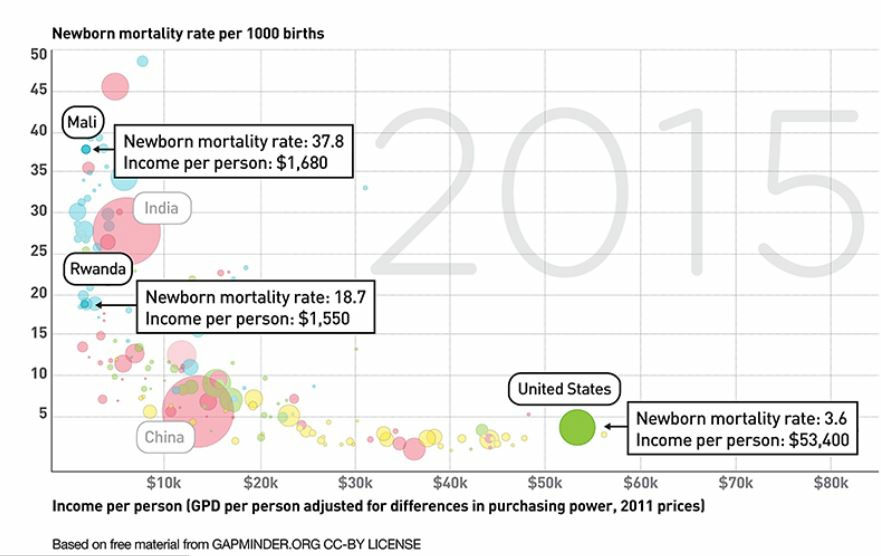 es Foundation's 2017 annual letter is far from a traditional annual report. Instead, it's a letter to Warren Buffet, who, in 2006, gave much of his fortune to support the Foundation's work.
es Foundation's 2017 annual letter is far from a traditional annual report. Instead, it's a letter to Warren Buffet, who, in 2006, gave much of his fortune to support the Foundation's work.
The report starts with a 2016 letter from Buffet asking Bill and Melinda Gates to, in part, to help "people better understand why success in philanthropy is measured differently from [sic] success in business or government."
The response focuses on "the stunning gains the poorest people in the world have made over the last 25 years." Data include the number of children's lives saved, 122 million.
With quotes from Melinda and Bill, the report includes progress on fighting disease and many charts to show declines in mortality rates around the world. We see such a rich variety of chart types: bar, pie, line, area, and area. In addition, the letter includes a table, photos, videos, and a wonderful bubble chart from Gapminder.org, founded by the recently deceased data visualization pro Hans Rosling.
Discussion:
- Analyze the Gates letter. What do you find most and least effective?
- Analyze each chart type against principles in Chapter 9. Is each the best choice for the data displayed? Could any be replaced with a more effective type of chart?
- How are photos and videos used strategically? What is their purpose?
- I wrote "[sic]" within Warren Buffet's quotation. What does this mean?
Twitter's New Time Out for Bad Behavior
 Twitter has been acting more and more aggressively against users who behave badly on the site with new rules for what's acceptable and what's not. Now, the company has started giving users a "time out" when tweets violate those rules. Actions may include limiting post views to followers. As the guidelines say, "Limiting the reach of potentially abusive content creates a safer environment and stronger Twitter community."
Twitter has been acting more and more aggressively against users who behave badly on the site with new rules for what's acceptable and what's not. Now, the company has started giving users a "time out" when tweets violate those rules. Actions may include limiting post views to followers. As the guidelines say, "Limiting the reach of potentially abusive content creates a safer environment and stronger Twitter community." 
Some users have complained about the practice, feeling that one word has gotten them into the dog house, but a Business Insider article interviewed an executive who gave a more holistic view of the decision process:
"A spokesperson declined to explain how Twitter determines if an account deserves to be temporarily restricted or totally suspended, but did say that the company looks at the overall context of an account's behavior rather than just potentially offensive keywords. So if an account repeatedly tweets offensive things to other accounts that don't follow back, Twitter could interpret that behavior as abuse and worthy of a time-out."
A page on Twitter's website explains five reasons to understand why "I'm seeing a message that my account is locked or limited": security purposes, account validation, rule violations, suspicious activity, or temporarily limited features, which is the latest addition.
Discussion:
- The decision to temporarily block reach could be tricky. What criteria do you think Twitter will use to determine whether this action is appropriate?
- In what ways will this new step be effective, and how might it fall short?
Will Chime Fix Meetings?
 Amazon is introducing Chime, a new product for online meetings and videoconferencing. Described as "Frustration-free meetings with exceptional audio and video quality," Chime is designed to compete with products like Skype, Google Hangouts, and GoToMeeting.
Amazon is introducing Chime, a new product for online meetings and videoconferencing. Described as "Frustration-free meetings with exceptional audio and video quality," Chime is designed to compete with products like Skype, Google Hangouts, and GoToMeeting.
GeekWire quotes an Amazon executive about the program:
"It's pretty hard to find people who actually like the technology they use for meetings today," said Gene Farrell, Vice President, Enterprise Applications at AWS in a press release. "Most meeting applications or services are hard to use, deliver bad audio and video, require constant switching between multiple tools to do everything they want, and are way too expensive."
Conference calls have become a joke. The video "A Conference Call in Real Life" has received more than 14.5 million views, and "A Video Conference Call in Real Life" has more than 700,000.
The Chime promotional materials focus on the technology, of course: ease of joining, automatic reconnection, mobile access, notifications, etc. But what about the people skills involved in managing a meeting? Isn't most of a meeting's success dependent on the leader and participants? Sure, technology can ruin an online meeting, but so can the people managing it.
Discussion:
- What, if anything, do you find appealing about Chime? How does it compare to other meeting programs?
- What percentage of an online meeting's success is attributable to the people? The technology? Is Chime over-promosing?
NBA Bans Mean Tweets
 The NBA is asking players to take the high road. Deputy commissioner Mark Tatum sent a memo to the 30 teams in the league:
The NBA is asking players to take the high road. Deputy commissioner Mark Tatum sent a memo to the 30 teams in the league:
"While we understand that the use of social media by teams, including during games, is an important part of our business, the inappropriate use of social media can damage the reputation of the NBA, its teams, and its players," NBA deputy commissioner Mark Tatum wrote in the memo obtained by ESPN.com. "Recently, social media postings (e.g., on Twitter) by some teams have crossed the line between appropriate and inappropriate. In addition to other concerns, such conduct by teams can result in 'Twitter wars' between players that can cause further reputational damage and subject players to discipline by the League.
"As a result, we want teams to be aware of the NBA's rules with respect to the use of social media by teams. As with in-game entertainment, teams are prohibited from mocking and/or ridiculing opponents (including teams, players, team personnel (including owners), and opponents' home cities) and game officials on social media in any form, including through statements, pictures, or videos."
...
"Teams may use social media for fun and light-hearted banter that does not reflect poorly on any team, player, other team or League personnel, or the League as a whole. However, such activity cannot become inappropriate or offensive. As such, we encourage teams to properly and extensively train their social media staff members to ensure that they know what kind of postings are appropriate and what kind are not."
The memo may have been inspired by Twitter banter about Chandler Parsons.
Mashable reports everyone being "obnoxiously nice" now. The sarcasm abounds.
Discussion:
- What's the difference between light-hearted banter and "inappropriate or offensive" language? I can see some fine distinctions here.
- What's your view of the recent sarcasm: fun, disrespectful, or something else?























